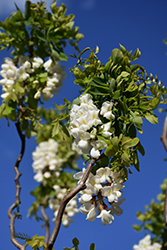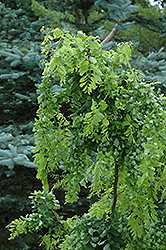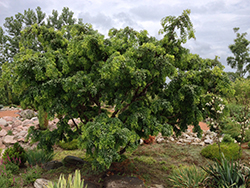make life beautiful
Plant Database
This is your garden planning resource.
Twisted Baby® Black Locust
Robinia pseudoacacia 'Lace Lady'

Twisted Baby® Black Locust flowers
Twisted Baby® Black Locust flowers
(Photo courtesy of NetPS Plant Finder)

Twisted Baby® Black Locust foliage
Twisted Baby® Black Locust foliage
(Photo courtesy of NetPS Plant Finder)
Height: 10 feet
Spread: 12 feet
Sunlight:
![]()
![]()
Hardiness Zone: 4b
Other Names: Common Locust
Brand: Star
Description:
Somewhat of an oddity, this is a compact garden-scale tree which features a contorted habit of growth and delicate foliage, spineless and sparse-flowering; best used as a focal point in the garden, bare branches are especially interesting in winter
Ornamental Features
Twisted Baby® Black Locust is primarily valued in the landscape or garden for its ornamental globe-shaped form. It has bluish-green deciduous foliage. The oval pinnately compound leaves turn yellow in fall. The twisted black bark and brown branches are extremely showy and add significant winter interest.
Landscape Attributes
Twisted Baby® Black Locust is a multi-stemmed deciduous shrub with a more or less rounded form. It lends an extremely fine and delicate texture to the landscape composition which can make it a great accent feature on this basis alone.
This is a high maintenance shrub that will require regular care and upkeep, and is best pruned in late winter once the threat of extreme cold has passed. Deer don't particularly care for this plant and will usually leave it alone in favor of tastier treats. Gardeners should be aware of the following characteristic(s) that may warrant special consideration;
- Suckering
- Insects
Twisted Baby® Black Locust is recommended for the following landscape applications;
- Accent
- General Garden Use
Planting & Growing
Twisted Baby® Black Locust will grow to be about 10 feet tall at maturity, with a spread of 12 feet. It has a low canopy with a typical clearance of 2 feet from the ground, and is suitable for planting under power lines. It grows at a fast rate, and under ideal conditions can be expected to live for 60 years or more.
This shrub does best in full sun to partial shade. It is very adaptable to both dry and moist growing conditions, but will not tolerate any standing water. It is not particular as to soil type or pH, and is able to handle environmental salt. It is highly tolerant of urban pollution and will even thrive in inner city environments. This is a selection of a native North American species.
A NetPS Plant Finder tool
